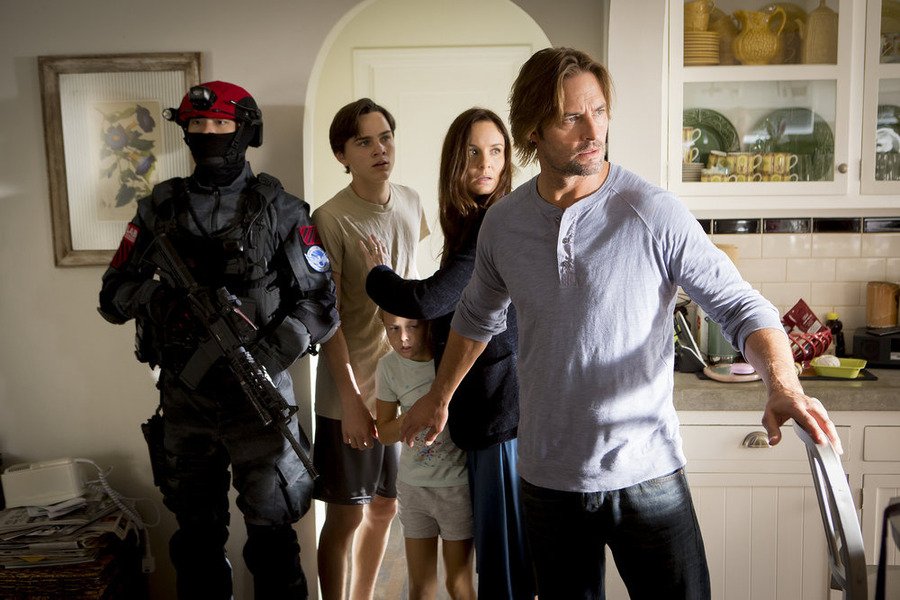Recommending USA’s new series “Colony” after viewing its first few episodes is sort of like checking a box labeled “Agree With Terms and Conditions” without reading the fine print. It’s not advisable, but alas, it is mandatory. Though the screeners provided to critics warn that spoilers are “embargoed until after” a given episode’s air date, the entire show is, in essence, a spoiler wrapped in secrecy. Story fragments are fed to the audience with just enough frequency to keep them hooked for more, though many viewers will have lost patience well before the program’s inaugural season has completed its run.
Of course, ambiguity has long been the name of the game for co-creator Carlton Cuse, a veteran showrunner best known for executive producing “Lost.” It’s interesting that Cuse’s latest sci-fi series is debuting at the same time his longtime collaborator, J.J. Abrams, is taking over the planet with his “Star Wars” reboot. Not only do both projects share certain key phrases, such as “resistance” and “stormtroopers,” they also are comprised of borrowed archetypes and age-old formulas. Yet whereas “Star Wars: Episode VII – The Force Awakens” triumphed by reviving the playful spirit of George Lucas’s beloved original trilogy, “Colony” has a blandly brooding tone synonymous with typical network TV police procedurals. It’s not all that compelling, in part because the very nature of the characters’ predicament is so vague, it frustrates rather than fascinates.
The pilot opens in an impossibly photogenic, sun-kissed household, as a news reporter declares the beginning of “just another boring, beautiful day in Los Angeles.” Of course, that’s far from the case, as the camera gradually reveals a formidable fence surrounding the deceptively tranquil neighborhood. Viewers weary of dystopian allegories crafted in the mold of “Hunger Games” and “Divergent” are likely to find “Colony” tiresome upon initial glance, with its segregated districts and malevolent forces of fascism (a teacher is punished severely for including “Fahrenheit 451” in her curriculum). Who, you may ask, are the villains holding LA—and potentially all of humanity—captive? That’s one major plot point the show itself has refused to spoil, at least in the episodes available to critics. All we know, more or less, is that an “arrival” has taken place, kicking off a countdown to what one sketchy character promises to be “the most important day in human history.” There are deadly drones displaying mechanical eyes straight out of “War of the Worlds,” as well as a rocket launch rendered in less-than-convincing CGI, though the show’s other co-creator, Ryan Condal, has already hinted that the powerful invaders may not, in fact, be aliens.
Juan José Campanella, director of 2009’s taut Oscar-winner, “The Secret in Their Eyes,” is credited with helming the first three episodes, and sustains enough tension to keep us interested, if not exactly riveted, as the mystery slowly unravels. Of course, the lack of context regarding the murky threat to our protagonists is designed to strengthen the metaphorical nature of “Colony”’s central conflict. Will our two central heroes, Will (“Lost” alum Josh Holloway) and Katie (Sarah Wayne Callies), comply with the elusive visitors’ wishes or revolt against them? The answer to that question would seem rather simple, except for the fact that Cuse and Condal have a MacGuffin up their sleeve in the form of Will and Katie’s missing son, whose fate is dependent on the couple’s willingness to join the governmental suppression of rebel insurgents. Articulating this ultimatum with smarmy self-righteousness is the Los Angeles bloc’s Proxy Governor, played by Peter Jacobson in a performance that suggests what a Vladimir Putin biopic would play like if it starred Steve Carell. He’s an amusing presence, but not exactly a threat.
Holloway and Callies are tasked with earning much of the audience’s investment, and they do as solid a job as expected. Both characters have secrets to hide from one another, yet their love still manages to transcend any societally imposed boundaries, at least for now. It’s especially nice to see Callies avoid any trace of the passivity all-too-often required of modern leading ladies, a troubling trend wonderfully analyzed last year in Gabrielle Moss’s Slate column on the rise of what she dubbed “the reactress.” Katie is every bit as involved in the action as Will, and in some ways, even moreso. Yet the greatest asset to “Colony” is the ever-superb Kathy Baker as a woman who sincerely believes that the guerillas’ efforts of sabotage are entirely futile. Her arguments are much more persuasive than anyone else’s, and add a much-needed dose of complexity into an otherwise black-and-white struggle toward freedom. Baker’s “guest star” status will inevitably limit her contributions, but it would be in “Colony’s” best interest to take a cue from her deftly nuanced work. The grayer the morality, the deeper the intrigue.












